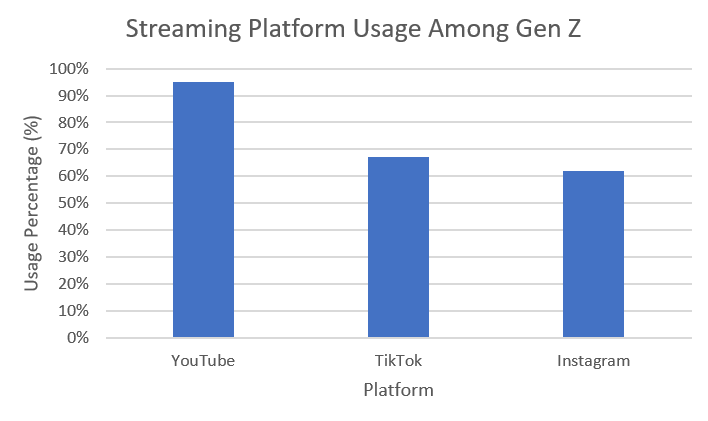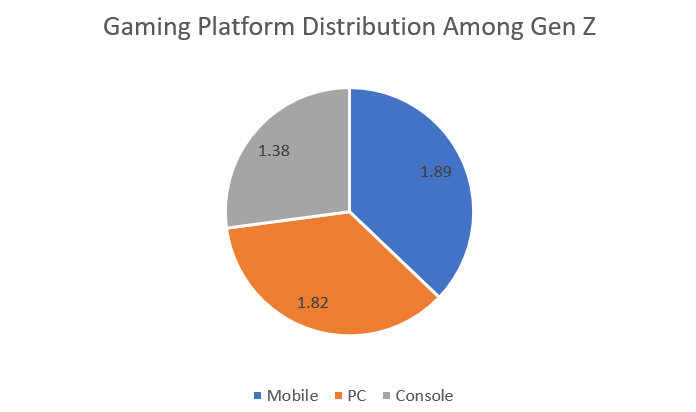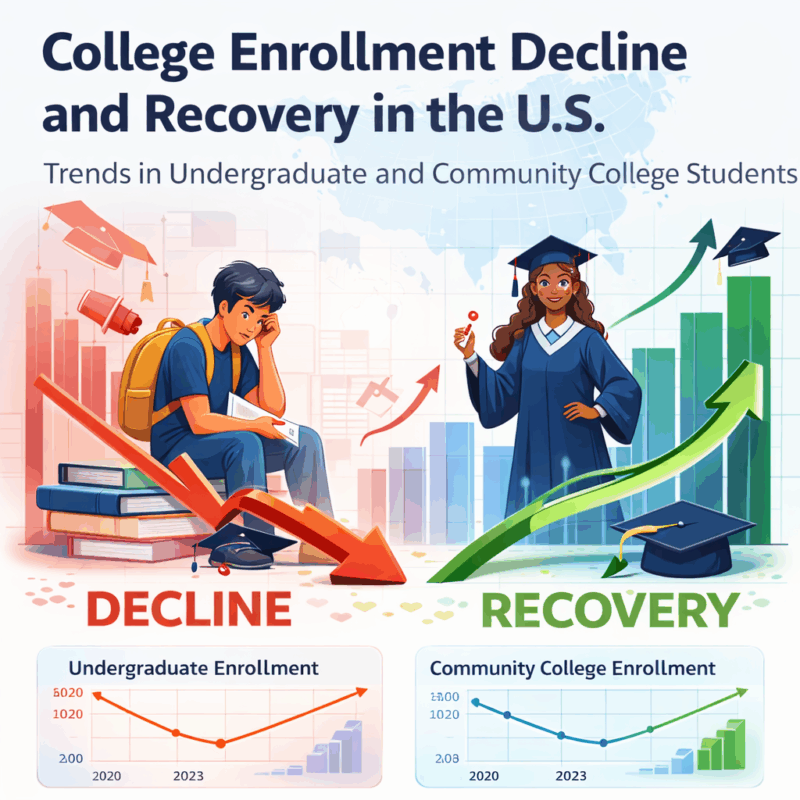The modern digital world has seen young people spend as much time as possible on the internet. The new generation of Gen Z, born between 1997 and 2012, and millennials, born between 1981 and 1996, are spearheading this change through strong participation in streaming and gaming platforms. These entertainments now hold center-stage in their lives, affecting not only their relaxation, but also their social integration and economic behaviors. Conventional television has lost its appeal, and Gen Z will most likely prefer computers and smartphones since they are interactive. Meanwhile, the spending capacity of Gen Z is skyrocketing. They also have a tendency to buy products from the brands they follow and those that share their values, using the social media activities they engage in (Brito, par. 10). The paper discusses the changes brought by streaming and gaming to Gen Z and Millennials in terms of the entertainment economy. These shifts occur because of content preferences, social interaction, authenticity, community engagement, creator power, and emerging technology trends.
Streaming and Gen Z’s Content Preferences
Streaming capabilities have greatly changed the media consumption of the younger generation. YouTube, TikTok, and Instagram have become the leading entertainment platforms of Gen Z and Millennials. 95% of Gen Z users actively use YouTube, and 67% are TikTok users, thus having a systematic preference in short-form, phone-first content (Content Science, par. 2; Rand, par. 4). These websites present a more interactive and personal experience compared to traditional TV. Specifically, Generation Z users tend to prioritize content such as vlogs, tutorials, and product reviews, which allow them to respond to creators through likes, comments, or shares. Young individuals are also discovering new entertainment via social media to a large extent. About 70% of Gen Zers discover new content or shows on apps such as TikTok and Instagram (Flores-Marquez, par. 4). As Mark Zuckerberg, CEO of Meta, affirmed during Meta’s antitrust trial, “The apps now serve primarily as discovery engines,” (Perez par. 6) strengthening the fact that younger generations have made social platforms their primary source for discovering content as well as personalized media consumption.
Figure 1: Streaming Platform Usage Among Gen Z

Such tendencies are driven by the need for content that is accessible and relatable. Streaming platforms have therefore created an entertainment system that embraces the younger generations’ way of life. Their ability to provide flexible and personalized content is an understandable reason why the streaming industry is growing worldwide.
Gaming as a Cultural and Economic Force
Another significant trend in the entertainment habits of Gen Z and Millennials relates to gaming. More than 81% of Gen Z respondents state that they play video games. The average time spent on gaming per week is 7 hours and 20 minutes (Newzoo, par. 5). Most of these consumers also spend money on in-game purchases, sustaining a gaming sector which, in the United States alone, earned $71.92 billion in 2024 (American Gaming Association, par. 1). A report by Limelight on global gaming states that mobile phones have become the most used gaming platform based on an average score of 1.89 on a scale of 0-4. PC gaming is the second largest at 1.82, followed by console gaming with an average of 1.38 (KommandoTech, par. 13). Such general involvement demonstrates how deeply embedded gaming is within everyday life.
Figure 2: Gaming Platform Distribution Among Gen Z

The social aspects of gaming are also appreciated. Many Gen Z gamers cherish the friendships and sense of community established using gaming platforms (Gumasing et al. 6). Games such as Fortnite, Roblox, and Minecraft are multiplayer games that support collaboration and communication and turn playing into a common endeavour. Moreover, cloud gaming has gained popularity. Solutions such as Xbox Cloud Gaming enable people to obtain games quickly without complex devices. This connectivity encourages the increasing popularity of gaming as a recreational and social activity. Overall, the combination of entertainment, community, and spending power makes gaming central to the entertainment economy.
Social Interaction and the Rise of Creators
Streaming and gaming are about viewing or playing, communication, and creation. They provide active social ecosystems where users may exchange experiences and ideas. For example, the digital experiences of Gen Z remain highly social, as three-quarters of Gen Z spend their free time online, largely texting and chatting and transforming media consumption into shared experiences across media platforms (Content Science, par. 5). With the help of platforms such as Twitch and Discord, it is possible to communicate with other users in real time, share advice, or chat. These relationships frequently become actual friendships. Meanwhile, a large number of young individuals are turning into creators. Approximately 64% of Gen Z creators think about making money through online platforms by creating gameplay videos, short-form videos, or live streams (Brito, par. 16). Such creators possess power among their peers. A study finds that 38% of individuals between the ages of 18 and 23 have made a purchase guided by the recommendation of a creator (Content Science, par. 13). The integration of content generation, social networking, and economic participation is redefining entertainment. It is no longer a passive activity but a chance to be creative, be part of a community, and generate revenue. With this transition, the Gen Z and Millennial generations are contributing to a more interactive, connected approach to the future of media.
The Power of Authenticity in Digital Media
One of the key values for Gen Z and Millennials in entertainment is authenticity. These generations like content that is authentic and familiar. Actually, 61% of the Gen Z population states they like to watch user-produced videos rather than highly produced content (Content Science, par. 14). Such a preference facilitates the popularity of such creators as MrBeast, who achieved fame due to his videos and frequently humorous content on YouTube. Due to the emphasis on real experiences and the influence of peers, social media outlets have emerged as reliable areas to find content. Gen Z primarily finds new content via social media and recommendations, and even suggests that it might be driven by influencers and communicated through personal messages, which highlights the effectiveness of social channels in influencing their viewing and gaming preferences (Content Science, par. 18). Such suggestions will prove to be more reliable than conventional advertising. Consequently, authenticity has a direct impact on viewership and consumer behavior. Companies and media that intend to be successful among younger audiences should concentrate on the aspects of transparency and enable creators to show their personalities. Authenticity can lead to loyalty, increased engagement, and the establishment of a long-lasting relationship with users and content. It also promotes the notion that entertainment must represent real life rather than presenting scripted or artificial situations.
Community Building Through Gaming
Gaming platforms provide not only places to play, but also locations in which users can create their communities and establish significant relationships. Online games provide a chance to cooperate, team up, and socialize. For example, Fortnite and Minecraft give users the option to build a world together, and Roblox enables people to create their games and experiences. Recent research shows that 65% of Gen Z gamers declare that they cherish the social connections they develop as they play (Gumasing et al. 6). Such interactions give a sense of belonging, particularly to users who might lack the feeling of connection with others using conventional methods. Livestreaming has also contributed another element of community to gaming. Twitch enables viewers to observe real-time gameplay across different games as they engage with other viewers in chats along with the streamer. This forms a combined experience like viewing a real-time event. In addition, gaming communities are multicultural and worldwide. An interest in a game can bridge the gap between people of different backgrounds. As Lisa Su, CEO of AMD, put it succinctly, “Gaming brings people together” (101 Inspirational Quotes), an opinion that highlights the degree to which digital platforms can build a connection across borders. This type of cultural exchange enriches not only the freedom of the gameplay but also the overall appeal of the game itself. Modern entertainment is all about community, and gaming offers one of the most compelling arguments for what digital platforms can do to unite people.
Challenges and the Future of Digital Entertainment
Although streaming and gaming are very advantageous, several issues should be overcome. Mental health is one huge concern. According to the research results, 44% of Gen Zers and 46% of Millennials experience poor mental well-being associated with incessant social media usage (Deloitte, par. 9). Excessive screen time, especially coupled with online comparisons, may cause negative views of oneself. The other issue is the advent of artificial intelligence in creating content. Although AI tools are beneficial, 63% of Gen Z report that they do not find AI-created content as authentic and trustworthy as human-generated material (Rand, par. 7). In the future, there is a high possibility of virtual reality and cloud gaming gaining more popularity. So far, 47% of Gen Z already have access to virtual reality tools, and this number will grow greatly in the next couple of years (eMarketer, par. 8). Also, Gen Zers are receptive to cloud gaming subscription services, which make quality games less expensive and readily available (Gumasing et al. 4). Such trends indicate that the entertainment industry has a great future that will be more immersive and technology-related. However, businesses should also remain highly focused on mental well-being, authenticity, and accessibility to attract younger users.
Conclusion
Gaming and streaming have entirely transformed the entertainment economy, particularly for Gen Z and Millennials. Such generations like personalized, interactive, and realistic content that enables them to think and socialize. Streaming services such as YouTube and TikTok provide flexible media pieces that they can relate to and that represent their interests and lifestyles. Meanwhile, gaming now includes social interaction, entertainment, and economic transactions, with groups and members basing their interactions on a common experience. The emergence of content creators and the appreciation of authenticity are also the main characteristic features of this new entertainment world. With the further development of digital platforms, businesses should be focused on the values and habits of the younger audience. Mental health issues and distrust of AI-generated content are some of the challenges that must be taken seriously. There is a possibility of seeing more virtual reality and cloud-based services with more intensified levels of immersion in the future. Finally, Gen Z and Millennials are not only consumers, but are driving the future of media and technology, and the economy and culture will be powerfully affected by their preferences.








